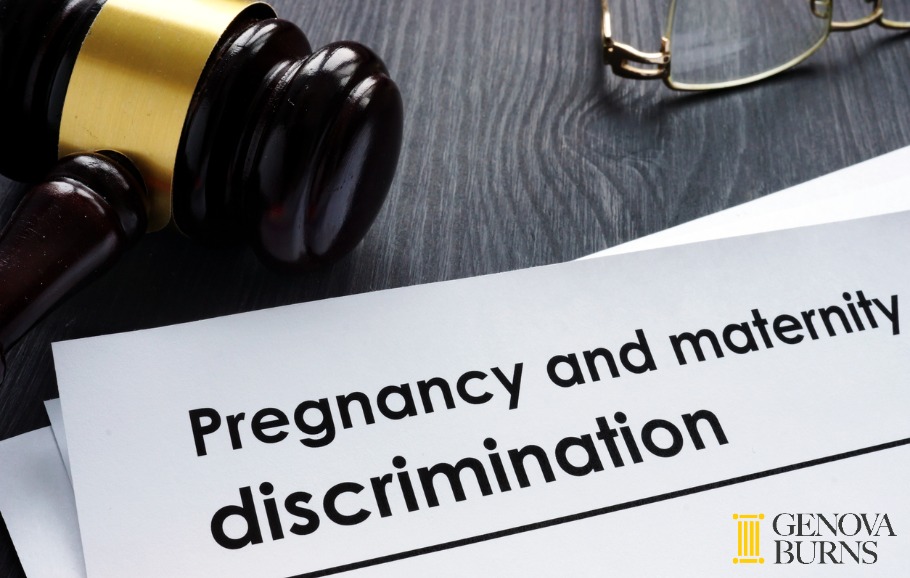The ABC’S Of The EEOC’S Proposed Regulations On Pregnancy: Accommodations In The Workplace
August 29, 2023 | By: Brigette N. Eagan, Esq.
Effective July 27, 2023, the Pregnant Workers Fairness Act (PWFA) requires employers with 15 or more employees, to accommodate pregnancy and pregnancy-related complications in the workplace. The Equal Employment Opportunity Commission (EEOC), which is the federal agency charged with enforcing the PWFA, recently issued proposed regulations clarifying employer obligations and employee rights under the PWFA. The PWFA requires employers to provide qualified employees and applicants with known limitations relating to pregnancy, childbirth or related mediation conditions with reasonable workplace accommodations, unless the accommodation causes an undue hardship. The key terms, underlined for clarity, are explained below.
Known Limitations
Known limitations are physical or mental conditions arising from pregnancy, childbirth, or related medical conditions. The proposed regulations explain that even minor, modest, or episodic conditions resulting in a known limitation are covered under the PWFA.
Pregnancy, childbirth, or related medical conditions:
The EEOC proposed regulations also provide a non-exhaustive list of medical conditions related to pregnancy which employers must reasonably accommodate (absent an undue hardship). These covered medical conditions are expansive and include:
- termination of pregnancy (including via miscarriage, stillbirth, or abortion);
- infertility and fertility treatment;
- preterm labor;
- nerve injuries;
- gestational diabetes;
- carpal tunnel syndrome;
- chronic migraines;
- dehydration;
- nausea or vomiting;
- swelling of the legs, ankles, feet, or fingers;
- high blood pressure;
- anxiety, depression, or psychosis;
- postpartum depression;
- loss of balance; vision changes, and varicose veins; and
- lactation and conditions related to lactation.
Because some of these conditions may or may not be related to pregnancy, the EEOC proposed regulations clarify that employers may engage in the interactive process with employees and request supporting documentation to determine whether the employee is qualified for a pregnancy-related accommodation.
Limitations on Supporting Documents
The proposed regulations provide limitations on an employer’s ability to request supporting documentation. Specifically, the employer’s request for documentation must be reasonable under the circumstances. The EEOC provides examples of circumstances where an employer’s request for documentation is unreasonable, such as when:
- the known limitation and need for reasonable accommodation are obvious and the employee confirms the obvious limitation and need for accommodation through self-attestation;
- the employee or applicant already has provided the employer with sufficient information to substantiate the known limitation and need for an accommodation; and
- the employee or applicant is pregnant and has provided a self-attestation to the need for breaks to drink or carry water or to eat, additional restroom breaks, additional sitting or standing breaks, or for accommodations regarding lactation or pumping.
Qualified
To be eligible for a reasonable accommodation under the PWFA, the employee or applicant must be qualified for the job. This means that the employee or applicant must be able, with or without reasonable accommodations, to perform the essential functions of the job. When leave is the requested accommodation, the proposed regulations clarify that the request is reasonable if the employee is reasonably expected to perform the essential functions of the job, with or without a reasonable accommodation, at the conclusion of the leave.
If the employee cannot perform the essential functions of the job, the employee may still be qualified (and eligible for an accommodation), if their inability to perform essential job functions is “temporary.” The EEOC’s proposed regulations clarify that temporary means lasting for a limited time, not permanent, and may extend beyond “in the near future.” In the near future means that the employee’s ability to perform the essential functions will generally resume within forty (40) weeks of its suspension. The EEOC explained that this 40-week guideline is not a set rule, but instead the actual length of the temporary suspension of the essential functions will depend upon the specific facts and circumstances at issue.
Reasonable Accommodations
Depending upon the specific circumstances, qualified employees may be entitled to the following accommodations:
- temporary suspension of essential job functions;
- temporary transfer to another position or light duty;
- job restructuring, part-time or modified work schedules, or reassignment to a vacant position;
- breaks for use of the restroom, drinking, eating, and/or resting;
- acquisition or modification of equipment, uniforms, or devices, including devices that assist with lifting or carrying for jobs that involve lifting and/or carrying;
- modifying the work environment; providing seating for jobs that require standing, or standing for jobs that require sitting;
- the ability to use paid or unpaid leave or telework;
- providing reserved parking spaces if the employee is otherwise entitled to use employer provided parking; and
- in connection with lactation, breaks, an appropriate space for lactation, and any other related modifications as required under the PUMP Act.
Undue Hardship
Under the PWFA, an employer is not required to provide any accommodation that would create an undue hardship. The EEOC’s proposed regulations define undue hardship as “significant difficulty or expense incurred by a covered entity.” Factors to consider in reaching an undue hardship determination include assessing the nature and cost of the accommodation, the overall financial resources of the facility, and the impact of the accommodation on operations.
Conclusion
Our firm will continue to monitor and report on the regulatory developments as issued by the EEOC. In the meantime, if you have any questions regarding how to comply with the PWFA and the PUMP Act, please contact Partners Brigette N. Eagan, Esq. via email here or Dina M. Mastellone, Esq. via email here in the firm’s Human Resources Counseling & Compliance Practice Group, or call 973.533.0777.
Tags: Brigette N. Eagan • Genova Burns LLC • David Franzmathes • Employment Law & Litigation • Human Resources Counseling & Compliance • Pregnancy Accomodation • EEOC • Accomodation • Dina M. Mastellone • Pregnant Workers Fairness Act (PWFA)


